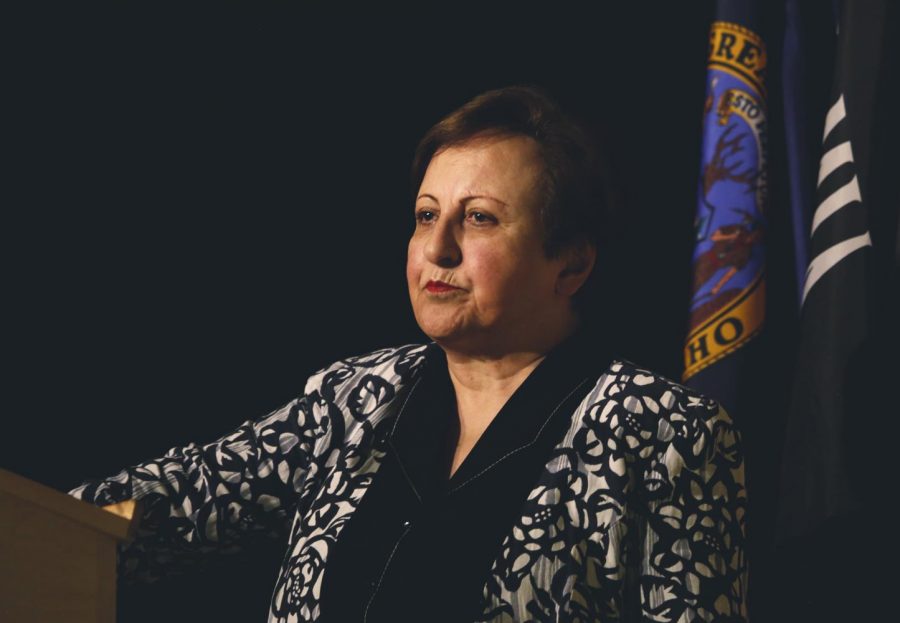Nobel Prize winner speaks about Human Rights at UI symposium
Shirin Ebadi is the first Iranian to receive a Nobel prize
RYAN PUGH | The Daily Evergreen
Iranian lawyer, human rights activist, and former judge Shirin Ebadi speaks on her vision to prevent war and promote equal rights in our world during her symposium at the University of Idaho Bruce M. Pitman Center.
October 16, 2017
Nobel Laureate Shirin Ebadi, spoke yesterday at the University of Idaho Pitman Center on tolerance, against the war in the Middle East and women’s rights through an international perspective.
She is an Iranian human rights activist and attorney who speaks out against hate and oppression. She rose to fame after the Iranian revolution in 1979 and is the first Iranian ever to receive a Nobel prize.
Ebadi was a keynote speaker for the Borah Symposium, which was created for students and the community to understand war and conditions for lasting peace. She walked up to the stage and gave her keynote address, with the aid of a translator.
She thanked the people who had brought her to UI and spoke on environmental issues and how they relate to current events.
Ebadi said that in the 20th century, experts said the world fought about oil. Now, she said, experts predict humans will fight about the environment.
“So in the twenty first century, our wars will be about water,” she said.
There is a problem in the world with internalized misogyny, Ebadi said, and toxic masculinity. They are both interconnected with the teaching of children, she said.
“How can a person who doesn’t know about peace or hasn’t learned about peace prefer peace?” she asked.
Ebadi then said that there must be a tolerance of people of different backgrounds in order to have lasting peace.
Islamophobia, homophobia, racism and more, are walls that people build that cut off basic kindness, she said.
“But, I’m scared of walls that we build between our hearts,” Ebadi said. “Walls that divide us and them—our world and their world.”
She said that today’s society has become more globalized, which is something people should keep in mind when interacting with one another.
“We live in the globalization era,” Ebadi said. “All of our destinies are intertwined, so as we keep and preserve our cultures, we have to be able to tolerate each other and live with each other.”
She spoke against terrorist groups, like both the Taliban and ISIS, and how the ideologies of both cannot be taken seriously.
“ISIS is not only a terrorist group, it is the wrong ideology,” she said, “and we cannot fight ideology with bombs.”
She continued the address by giving real-life and metaphorical examples of how women, men and international communities face oppression. Although, Ebadi said, women in the West have to face less oppression, oppression exists on a global spectrum.
At the end of the address, there was a questioning period from the audience. Many students felt the address spoke to them in terms of war and women’s rights. After the event, students both agreed and disagreed with her statements.
George Ngalamulume, a student at UI, said that there is a need for female leadership.
“The history has always been male, so the future is women,” he said, “women can do just as much more as men can do.”
Lexy Wilson, another student at UI, said that the speech resonated with her in terms of ideology and compassion.
“When we can recognize and identify with the sorrow, pain, dreams, love and compassion in others,” she said, “that is where a change in ideology really becomes reality.”
Formerly a magistrate judge, she was demoted to clerical duties after the revolution because the government that rose to power decreed all female judges should not pass judgment.
Romauld Afatchao, associate director of the Martin Institute and programs in international studies, is one of the members on the Borah Committee responsible for planning the event. He said the goal this year was to continue the tradition of bringing in speakers to talk about peace.
“We tried to go back to the roots of the Borah foundation,” he said, “and what the senator, William Edgar Borah, … wanted to do, which is basically the idea of outlawing war.”
Afatchao said that since this is the 70th anniversary, they wanted to continue the ideology of peace. The Borah Foundation & Symposium was founded by William Borah to promote peace. This was the first in a three part series, he said, from Oct 16-17.
“Before then, war was a tool of international affairs,” he said, “you’ll see today, war is not legal anymore unless authorized by the United Nations.”
Chair of the Borah Foundation, Steve Daley Laursen introduced Ebadi to the audience. He said that it was a great pleasure to chair the symposium this year.
“The Borah Symposium is a program devoted to understanding the causes of war and the conditions of peace—lasting peace,” he said.









